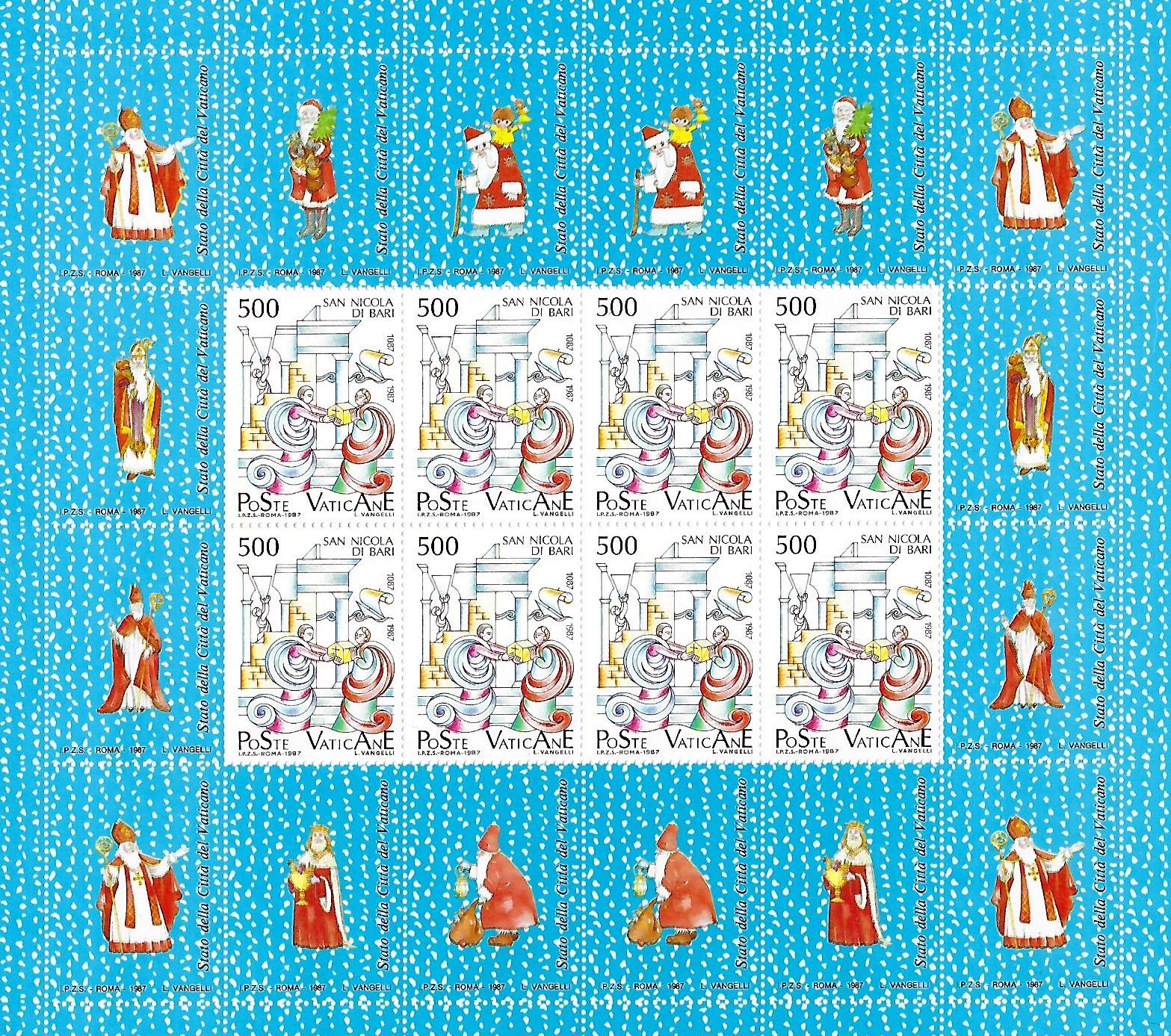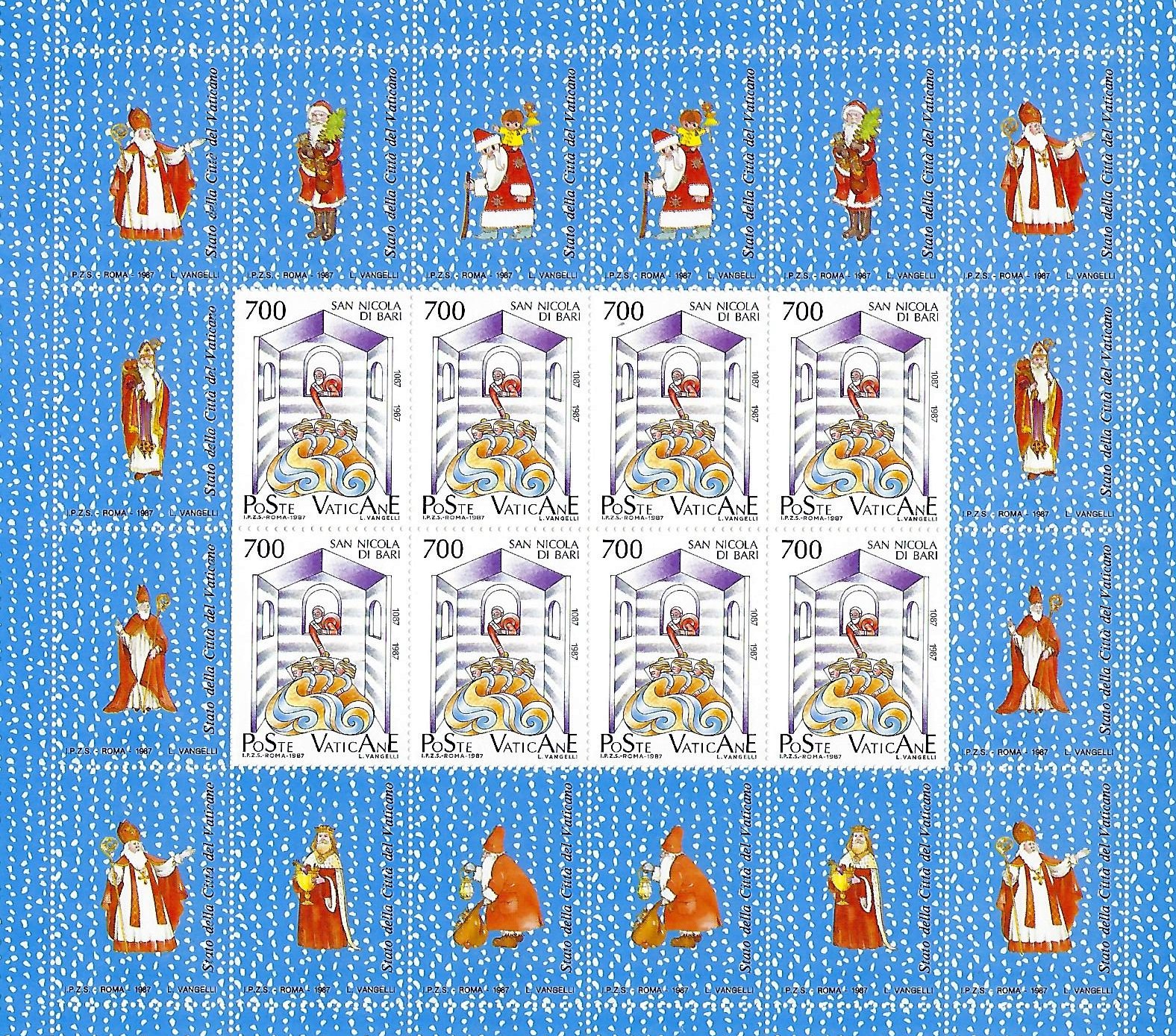
Home


 Transfer of the Relics of St Nicholas From Myra to Bari, 900th Anniversary 500 lira: Transfer of his relics from Myra to Bari 700 lira: Offering of bags of gold coins to three daughters of a man who fell into poverty (thus saving their honor) 3000 lira: The miraculous rescue of a ship Scott 803-805 (1987) December 6 is Saint Nicholas Day, the feast of Saint Nicholas. It commemorates his death in Myra, Turkey, in the year 343 AD. Nicholas was a 4th century bishop of Myra (Lycia in southwestern Turkey, now known as Mugla). A Nicholas cult was established in the 6th century and spread to the West in the 10th century. When Muslims took over Turkey, some of Nicholas’ relics were transferred in 1087 to Bari, on Italy’s Adriatic coast, a city in which there was a large Greek immigrant community. In addition, Venetian sailors took some of his bones as relics to Venice. The Basilica of St. Nicola di Bari was built 1087-1197 and is a center for pilgrimages by both Greek and Latin Christians.  The Basilica of San Nicola, Bari, Italy With Statue of Saint Nicholas Photo by Holger Uwe Schmitt From Wikimedia Commons, used under terms of the Creative Commons Attribution-Share Alike 4.0 International license In addition to the Basilica at Bari, many churches have been named for St. Nicholas, and there have been many artistic depictions of the saint. Historian David Farmer suggests that San Nicola was “the most frequently represented saintly bishop for several centuries.” St Nicholas is the patron of many causes – children, sailors, unmarried girls, merchants, pawnbrokers, apothecaries, brewers, perfumers, among others. His most popular representation is that of Santa Claus – the giving of gifts to children – known as Father Christmas or the Dutch Sinte Klaas. Historian Donald Attwater observes that Nicholas “…is the patron of countries provinces, dioceses and cities, titular of churches innumerable...and [is] represented countless times in paintings and carvings. Yet what can be confidently stated of his personal history is no more than that he was a bishop of Myra….”His emblem is three balls – representing the bags of gold he presented to unmarried girls as a dowry to protect them from a life of prostitution. The same symbol is used for pawnbrokers. Saint Nicholas was been commemorated by Vatican City in a set of three stamps marking the 900th anniversary of the translation of his relics to Bari (shown above). The stamps were issued in minisheets of 8 stamps, with the stamps surrounded by 16 letter seals "portray[ing] some of the different ways in which popular imagination has represented the saint", as stated on the Philatelic Office release for the stamps: 

 Transfer of the Relics of St Nicholas From Myra to Bari, 900th Anniversary Minisheets for Scott 803-805 (1987) In addition, a fresco of Saint Nicholas from the Cathedral of Nardo (Italy) was presented as part of a five-stamp issue commemorating the 600th anniversary of the Cathedral, issued in 2013: 
Fresco of Saint Nicholas of Myra Cathedral of Santa Maria di Nardo Scott 1547 (2013) As an editorial note, I am a big fan of the Discovery Channel series, "Expedition Unknown", starring adventurer Josh Gates. The final episode for 2024 was entitled "Twas the Search for Saint Nick", which was described as follows: "Josh goes in search of the bones of Saint Nicholas, the historical inspiration for Santa Claus. He visits the saint's place of origin in Myra, Turkey, and locations of his possible remains: [including] Bari and Venice in Italy and even in Chicago."In one scene, he visits Bari and participates in the saint's festival and feast day Mass. It is an entertaining and informative look at the history of Saint Nicholas, and a nice way to start the Christmas season. REFERENCES: |